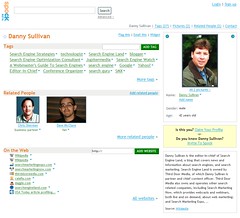A little startup called Spock.com [1] has moved into public beta today for their official public launch – previously they were only available to a handful of invite-only beta-testers. Spock is to white pages what Google Maps was to yellow pages – Spock is a sort of people search engine that pulls data from many different sites together to automatically form personal profiles of individuals. The service also allows one to search for people who match up with certain criteria like celebrities, kidnapped children, billionaires, sudoku fans, “journalists killed in Iraq”, “Baptist women who love to travel”, etc.

Spock is one of a new breed of people search engines which pulls data in from a variety of online sources including MySpace, LinkedIn, My Yahoo!, Wikipedia, company websites, blogs, and other sources to compose these composite profiles which include photos, descriptions, links to people related to the person in question, and tag lists of common keywords. Check out this search I did for “Danny Sullivan”:
And, here’s the profile Spock generated for the search engine marketing “Danny Sullivan”:
This automatic generation of profiles from other data sources, similar to a meta search engine, is not all that new, of course – ZabaSearch [2] has been touted for doing similar stuff to compose info on people out of various public records, sort of like a poor man’s background search. And, ZoomInfo [3] has worked to build a directory of searchable business profiles of individuals. IceRocket [4] also used to have a metasearch engine that pulled in data from a handful of various singles/personals sites.
What makes Spock a bit different is how they’re actively composing these profiles from sources that really haven’t been associated with one another previously, and making them publicly available, for “free” (eventually paid for by ad revenue, of course). While the general public likely hasn’t been aware of it, the CIA or NSA has actually also been working on a similar sort of search engine system which automatically composes secret dossiers of information on individuals from a multitude of sources including credit card information, criminal databases, as well as many of the same online sources used by these web services like ZabaSearch, ZoomInfo, and Spock.
Spock has already sparked a small amount of concern just as all people search engines have, due to how they remove barriers to easily finding information about individuals – something which always makes people very nervous. A recent Time article on Spock, “Online Snooping Gets Creepy [5]“, states that it’s controversial because while individuals may opt into providing info on many of the sites that Spock gleans information from, those individuals have not opted into participation in Spock, nor have they agreed to having each datum they put in one site associated with all the other data they may have in other websites. An even bigger concern, both with Spock and with the secretive dossiers generated by the American government on individuals, is that these sorts of automatically-generated profiles inevitably will have some amount of mistakes associated with them, and those mistakes can negatively impact people’s lives.
Nearly any of us who have the misfortune of having extremely common surnames like “Smith” or “Jones” and common first names have had the experience of having our identities confused with many other people’s, and the age of information has only accelerated the effect. At my old company, I had my email address assigned to other “Chris Smith”s not once but twice, for instance, and I used to receive confidential email notes intended for the “Chris Smith” who was in our HR office. I know another gentleman who is a retired, conservative, law-abiding citizen who’s very common last name has put him on a watch list, so he looks forward to special treatment any time he goes to an airport.
What if Spock frankensteins-together a profile that contains incorrect, embarrassing information? A prospective employer might not hire you, people might choose not to date you, and people could assume the worst about you based off incorrect info.
White pages directories have long had to manage consumers’ privacy concerns, but at least that industry has had some time to build up some ways of managing those issues. And, giving individuals the power to choose to be unlisted if they desired removes some of the sensitivity. In white pages directories, one can typically choose to be unlisted or “ex-directory”. In Spock, you can apparently register to update/correct your info, but not remove it. This is another case of technology outpacing our understanding of how to deal with it.
I’m personally not terribly concerned with services like Spock, since I’m accustomed to them, and since I have consciously exposed a lot of personal information on the internet. But, I’m sympathetic to people who may’ve wanted to keep their informal MySpace profiles separate from their professional information, and who may now be surprised to find them all smashed together on services like this.
Otherwise, Spock is a really cool idea, and I like a lot of the clever things they’ve done in assembling information and making it searchable. There appear to be a number of useful applications possible in Spock, aside from the fluffier celebrity profile stuff.
Oh, one other aside, too: Spock appears to’ve purposefully built themselves with very search-engine-friendly URLs, likely with the intention of optimizing to get lots of natural search traffic. For instance, my “Danny Sullivan” search query was formed like this: http://www.spock.com/q/Danny-Sullivan. I bet this explains their hyper-focus on celebrity profiles, since searches for those celebs’ names would likely drive a lot of traffic/revenue to them, once their pages are indexed! Spock is already enjoying a PageRank of 5, and Google is showing 666 pages indexed so far.
(VentureBeat’s writeup on Spock [6] is worth reading, and I see that Greg Sterling just mentioned Spock [7] on Search Engine Land a few minutes ago, too.)

